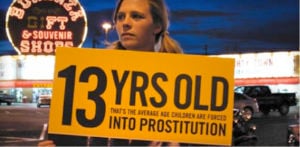 Did you know that there is an estimated 14,500 to 17,500 foreign nationals trafficked into the United States each year? Shockingly, the number of U.S. citizens trafficked within the country is even higher!
Did you know that there is an estimated 14,500 to 17,500 foreign nationals trafficked into the United States each year? Shockingly, the number of U.S. citizens trafficked within the country is even higher!
“Is it really that bad?” is the question usually asked- the answer is undeniably, “Yes!” According to the 2009 Domestic Minor Sex Trafficking report by Shared Hope International, which reported in-depth on the high prevalence of child sex trafficking in the United States, the number of American children at risk of being pulled into the sex industry is an estimated 200,000. Shockingly, the average age of entry in the sex trade industry in the U.S. is only 12 years old. There is no stereotypical face of slavery; the chains of modern slavery can bind anyone of any gender, race, religion or age. Those trapped by slavery do not have to cross borders to be victimized, for one can be exploited within their own home, community, as well as halfway across the globe. The issue of child trafficking and sexual exploitation has all to often been deemed an international issue, leaving the child victims in the United States overlooked. Therefore, many states continue to inadvertently provide safe havens for sex trafficking, including for minors.
Therefore I was excited to be watching as Shared Hope International announced Protected Innocence Initiative in San Antonio, Texas on Thursday. The long awaited report from the extensive project looked at the sex trafficking legislation in all 50 States and the District of Columbia, and then gave each state a letter grade and full report card. “Each state’s laws show omissions in protective provisions for child victims, and lack strong laws to prosecute the men who rent the bodies of other men’s children,” said former Congresswoman and the President and Founder of Shared Hope International. “Early in our research it was clear that responses to child sex trafficking must originate at the state level. The Protected Innocence Initiative establishes the essential legislative framework that attempts to harmonize the state’s response to the treatment of prostituted children and emphasize the appropriate prosecution of the buyer.”
The report graded each individual state on whether it has laws to protect children who are pushed into the sex trade and laws established to punish those who seek out such services. Leaders of the group say there’s a lot of room for improvement. The results of the report were shocking to most, as over half of the states received grades of D or F.
“Laws in Washington state and Texas are strong, Smith says, but many other states are falling down on the job — miserably. ‘They didn’t have trafficking laws, or if they had a trafficking law, it didn’t deal with commercial sex … or didn’t distinguish between children and adults,’ Smith says. She says the report, prepared with the American Center for Law and Justice, is designed to help states draft model laws to help fight trafficking (NPR).”
According to the report, 41 states have failed to adopt strong penalties against human trafficking. However four states- Maine, Virginia, West Virginia and Wyoming- have quite literally failed the grade as they have not imposed any specific restrictions on the crime of human trafficking. Massachusetts had no statute specifically targeting sex trafficking until one was signed into law just a few days ago. The report also found 10 states without sex trafficking laws and 19 where it is not a crime to purchase sex with a minor. The report additionally noted that in Iowa, Massachusetts, South Carolina and Wyoming there is no law criminalizing the use of the Internet to purchase or sell sex with a minor.
While the statistics on child slavery are shocking, not enough is being done both domestically and globally to bring an end to these practices. However one does have to begin at home. One reason that human trafficking has become such a plague in our nation is that we live in a world of denial; people repeat phrases such as, “it doesn’t happen to here,” or “it couldn’t happen to me or someone I know,” but the reality is that it does happen here, and it could happen to anyone. No city, state or country is immune to the plague of modern slavery.
How to win the battle and save our children
While many NGOs and governments have made strides to combat trafficking, there is a great deal of room for improvement in the global fight against child trafficking. Victims of trafficking need to first be seen as just that, victims, as opposed to criminals. Children are placed in juvenile detention centers, and are sometimes violated instead of protected. There are very few rehabilitation services for victims in places where trafficking remains high, and though there are some shelters, little effort is placed on the mental health of former victims. Many victims have not only endured sexual and physical abuse, but also drug addiction and sexually transmitted diseases, including AIDS.
What can you do?
Check the full report now to see how your state did and then let your congresspersons know whether they’re doing enough and help your state work to improve the protection of children.
If you are a victim of trafficking, know a victim of trafficking, or suspect a case of trafficking please contact the Resource Center, call 1-888-373-7888, or email [email protected]. The toll-free hotline operates year round, 24 hours a day, seven days a week.
Some Red Flags to look for include: